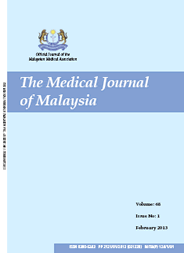MJM, Vol 70 Supplement 1 September 2015
The Burden of Young-onset Diabetes in the Joint
Asia Diabetes Evaluation Program (JADE)
Division of Endocrinology, University of Alberta, Canada
ABSTRACT
In contrast to Caucasian populations where the majority of younger patients have been diagnosed with autoimmune Type 1 diabetes, Asian countries are facing a rising prevalence of young-onset Type 2 diabetes concordant with the rapid urbanisation and industrialisation. People with young-onset Type 2 diabetes are at high risk of complications given the longer expected duration of disease. Given the shifting demography, little is known about the epidemiology of Type 2 diabetes in this young-onset Asian population.
The JADE program is a technologically enhanced diabetes management program which uses structured data collection and a protocolled work flow to clinically manage people with diabetes since 2007. JADE is now in primary and specialty clinics across 11 countries including Malaysia, China, India, Hong Kong, Philippines, South Korea, Vietnam, Singapore, Thailand, Taiwan, and Indonesia. We found that 1 in 5 patients have been diagnosed with Type 2 diabetes under the age of 40 years. These younger patients were more likely to have worse lifestyle habits including smoking and poor diet, despite being more likely to have received diabetes education. Familiar clustering was seen, with two thirds of young-onset patients having a family history of Type 2 diabetes. These younger patients also had higher rates of obesity and HbA1c than their counterparts diagnosed over the age of 40 years, and were less likely to be appropriately treated with statins, antihypertensive medications, and renin-angiotensin blockade.
Younger patients were less likely to meet guideline-targets for glycaemic, blood pressure, and LDL-cholesterol control, likely due to the silent nature of these risk factors. The individual and public health burdens of diabetes require urgent intervention to counter the impending tide of diabetes-associated complications, including the development and implementation of healthcare systems which provide ongoing risk factor management to those with established disease, and periodic surveillance to those at high risk.
